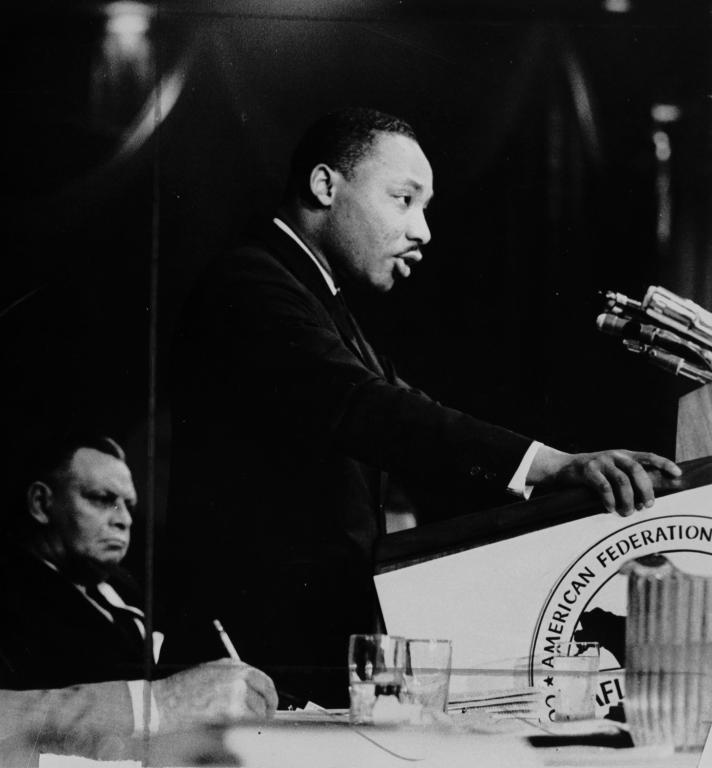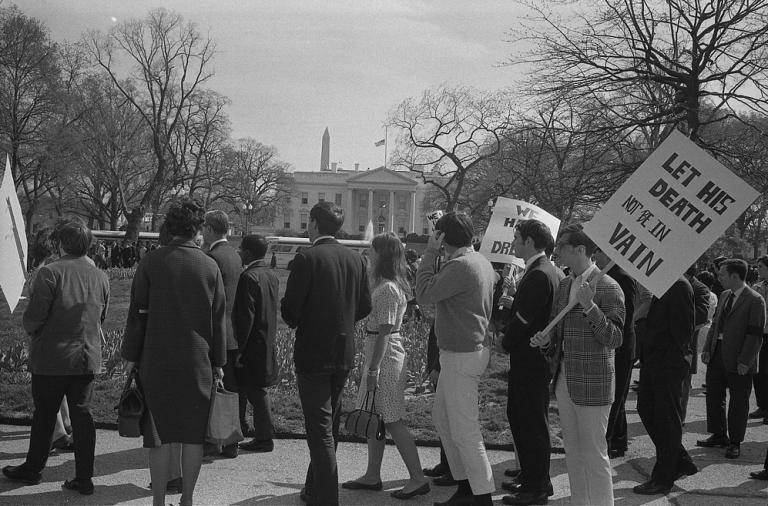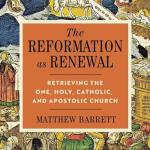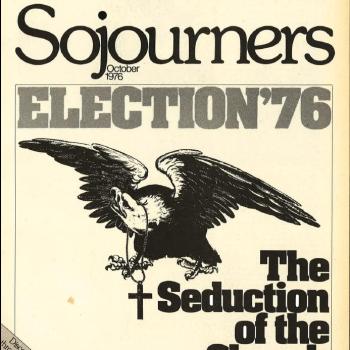The Rev. Dr. Martin Luther King Jr. and Christianity Today have a history together.
Founded in 1956, Christianity Today established its footing in the same years as King, who became a public figure following the Montgomery Bus Boycott of 1955. Both inhabited the broad world of American Christianity. Both sought to shape their constituencies through words formed by faith.
Throughout his lifetime and in the months following his death, Christianity Today published fifty-two pieces referencing King. Reviewing these pieces fifty-five years after King’s assassination is sobering. Undoubtedly, any of us appraising words we wrote decades prior would wish for revision. The words of Christianity Today are no different.
While space does not permit a thorough engagement of all fifty-two articles referencing King, two particular themes emerged from those articles. First, during King’s life, the magazine dismissed “civil disobedience” as a method for change. Second, after his assassination, the editors of Christianity Today justified the racial politics of their overwhelmingly conservative white evangelical constituency by reinterpreting King’s life in ways that were out of step with history. At its very best, Christianity Today was critical of white evangelical silence. Following the attack on the marchers in Selma the editors wrote, “For all the inconsistencies and fantastic proof-texting of the clergy marchers, they offered a striking contrast to the host of evangelicals in America who remained silent.” At its worst, however, the magazine amplified disturbingly reactionary, racist perspectives. One of the letters that the magazine published in the weeks following King’s murder espoused the belief that the great civil rights leader’s “sin reaps its reward.”
As Christians committed to the truth, we ought to reckon with the past as it was, not as we wish it had been. The hope in reviewing this history is to tell the truth about where we’ve been, with an eye toward a more faithful future. As King himself declared in his Nobel Peace Prize acceptance speech, “I believe that unarmed truth and unconditional love will have the final word in reality.”
Civil Disobedience
Christianity Today was clear: God would never bless social protest, even in the face of heinous injustice.
An editorial published December 4, 1964 concluded that the only stable solution to “the vexing social problems” (namely, King accusing the F.B.I. of “being slack in civil rights responsibilities”) is to be found “from a sustained dedication to the whole range of spiritual priorities – truth, righteousness, and love included.”
By contrast, civil disobedience led to death, according to Christianity Today’s Executive Editor L. Nelson Bell. Following King’s assassination, Bell’s regular column was the first to address the civil rights leader’s murder. Bell surmised that King’s assassination resulted from the civil disobedience he promoted. If not checked, “civil disobedience can lead to the dissolution of law and order…to revolution… [which] can open the way to dictatorship, with the resulting loss of freedom.” Bell conceded that King’s death was “tragic,” before adding, “When Dr. Martin Luther King, who may well be one of the noble Americans of the century, deliberately defies a court order, then he ought to go to jail.”
Such a comment exemplified the overall response of Christianity Today to King’s assassination.
The pattern consistently utilized in the magazine’s articles following King’s murder was to provide a clear statement condemning King’s assassination before proceeding to critique his former followers and his tactic of civil disobedience. Such a pattern critiqued King as well, albeit indirectly. It was a paternalistic condemnation from the magazine asserting that their approach, specifically law and order plus Christianity, was the proper path forward.
The editors utilized this pattern in the first major editorial to discuss King’s assassination, “Johnson, King, and Ho Chi Minh.” The first two paragraphs provided a fairly positive view of King and the cause he promoted. The editors described, “Even though the Civil War freed the slaves, many Negroes have been second-rate citizens…King courageously led the struggle against racism.” The subject then shifted from King to the civil disobedience he upheld. After critiquing the effectiveness of the recent strike of garbage workers in Memphis that King led, and lamenting the riots that arose following King’s assassination, the editorial stated clearly, “What the American Negro seems not to grasp is that Supreme Court decisions and the widening claim of law in American life have done more for Negro equality than has civil disobedience.” The editorial proceeded to describe the reaction of “Washington Negroes” to King’s murder as “primitive, even barbaric,” before adding that what is “desperately needed is a cultivation in American life of the simple Christian virtues of love of neighbor, good will toward men, and a spirit of reconciliation.” While the editorial began with a positive view of King it quickly shifted to a critique of “Washington Negroes” before concluding with a call to faithful Christian living. The horror of King’s assassination was not the main concern of the authors.
Revisionist Remembrance
In the aftermath of King’s assassination, Christianity Today remembered King in terms and recognitions not used during his lifetime. While alive, the magazine rarely carried a good word about King. He was not included in their coverage of the passage of the Civil Rights Act of 1964 nor the Voting Rights Act of 1965. When he won the Nobel Peace Prize in 1964, the magazine noted it in one sentence. Yet, almost at the moment of his death, Christianity Today began to wax nostalgic for his early career.
In the “Special Report” dedicated to “The Life and Death of Martin Luther King,” published in the April 26, 1968 issue, the opening paragraph praised King: “The nation mourned the assassination of its greatest Negro leader and the civil-rights movement received its greatest martyr.” The second paragraph shifted the focus to the rioting and looting that followed saying, “his death carried no promise,” and that the violence which followed was “as senseless as the slaying in Memphis.” After granting that King was “probably the American most admired in many other nations,” the article added, “At home, his power and glory were on the wane.” The article proceeded to describe an era of King’s work that held more promise than his recent work:
Not so long ago whites and blacks joined hands to look in buoyant faith toward King’s promised land…the tactics were marches and other non-violent protests. And the victories came fast…From the Montgomery bus boycott of December, 1955, through the Selma march and the passage of the 1965 Voting Act, the civil-rights movement was King’s kingdom. The golden age came in the massive, integrated March on Washington in the summer of 1963 and the far-reaching Civil Rights Act of 1964. King’s personal peak came that year with his trip to Oslo to accept the Nobel Peace Prize.
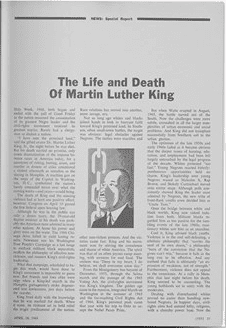
If such an era existed, Christianity Today never reported on it. This was the first time in Christianity Today that King’s work was linked to the passage of the Civil Rights Act of 1964 or the Voting Rights Act of 1965. Further, the picture of the March on Washington painted in this quote differed from the article produced by the four Christianity Today reporters who covered the march, and whose only comment about King was that “he cried again and again ‘I have a dream’” followed by a note that people slept for much of the afternoon. If that era was “the golden age,” it was acknowledged as such only after King’s assassination.
Christianity Today’s editors also turned King’s words against the very people he shepherded. The “Special Report” following King’s murder went on to describe in detail how King was against violence, and how he “advised black youth” to “cool it.” King was quoted saying that violence “carries the seed of its own doom.” By including these quotes alongside a critique of the riots and violence that erupted after King’s assassination, Christianity Today implied that King would be against the current violence. More importantly, it implied that King would be on the side of those like Christianity Today rather than “militant blacks.”
The June 21, 1968 issue included a lengthy article titled “Fiasco at Resurrection City,” juxtaposing King with the movement he once led. The Poor People’s Campaign participants are described as “Ralph Abernathy-led crusaders [who] are making a shambles of their campaign.” Abernathy’s leadership was contrasted with King’s: “To the Negro civil-rights movement mesmerized by the charismatic oratory of Martin Luther King, Jr., it is becoming increasingly clear that new leader Ralph Abernathy possesses neither the eloquence nor the administrative ability to attract and hold followers.” Christianity Today idealized a previous era under King while lamenting the changes under his successor. Mere weeks after King’s murder, his work was being reinterpreted for purposes contrary to his own.
A More Faithful Future
Christianity Today and The Rev. Dr. Martin Luther King Jr. continue to have a history together.
In recent years, the magazine’s editors have made faithful choices to address the publication’s past while building upon the life, work, and legacy of King. Such work is central to the Christian faith.
This article continues this work by reviewing Christianity Today’s coverage of King during his lifetime and immediately after his death. While only a few choice quotes were shared, these quotes represent the body of material found in Christianity Today, during Martin Luther King’s life. Encountering these articles helps resist the temptation to remember past reporting that did not exist. What did exist was a magazine that dismissed “civil disobedience” as a means of societal change, and reimagined King for its purposes in the aftermath of his murder. By acknowledging and grappling with this past, Christianity Today can continue the work of living into a more faithful future marked by the principles it has long espoused: “truth, righteousness, and love.”
Brian K. Ballard is a Ph.D. student in Homiletics at Princeton Theological Seminary. He is an ordained minister in the Presbyterian Church (U.S.A.).


